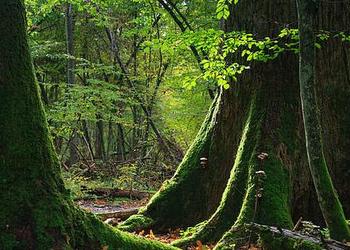
WARSAW, Poland, June 24, 2018 (ENS) – Bialowieza Forest on the border between Poland and Belarus, is a vast extent of primary forest in the watershed of the Baltic Sea and Black Sea, covering an area of 141,885 hectares (548 square miles). Northeastern Europe was once covered by just such ancient woodlands.

The old growth Bialowieza Forest, which includes extensive undisturbed areas where natural processes are on-going, shelters a diverse, rich wildlife – 59 mammal species, including wolf, lynx and otter; plus more than 250 bird; 13 amphibian; seven reptile and over 12,000 invertebrate species.
A large proportion of the remaining wild European Bison live on the Bialowieza Forest. The approximately 900 bison there are almost 25 percent of the total world population.
Europe’s last lowland primeval forest, Bialowieza is protected as a national park and UNESCO World Heritage Site.
Despite these protections, former Polish Environment Mininster Jan Szyszko, a forester, announced in March 2016 that he would approve a tripling of logging in the forest, despite warnings from scientists all over Europe that this would harm the forest and the rare species that live in it.
Szyszko decided to authorize logging even in the oldest parts of Bialowieza Forest, for the alleged reason of fighting a bark beetle infestation.
It is true that almost half of the trees in the entire forest are dead, eaten away by infestation of the spruce bark beetle. But there is scientific controversy about the best way to manage the beetle infestation.
Environmental groups immediately raised the alarm and in April 2016, seven Polish and international NGOs filed a formal complaint to the European Commission to warn that by logging, Poland had breached Articles 6(2) and 6(3) of the Habitats Directive and Article 4(4) of the Birds Directive.
The Commission launched a lawsuit, and in July 2017, the case was referred to the EU Court of Justice, which issued an injunction banning logging across the entirety of Bialowieza Forest except in circumstances concerning public safety. Despite this, trees continued to be felled every day.

After a change in the government in December 2017, Poland’s new Environment Minister Henryk Kowalczyk suspended most logging in January pending the Court’s final decision.
The Court of Justice ruled on April 17 that the logging in Bialowieza Forest is illegal because proper assessment of the forest had not been done, because of scientific controversy over how to stop the spread of the spruce bark beetle, and because it endangers the protected species within the ecosystem through deterioration or destruction of their breeding sites or disturbance of their rearing periods.
The life cycles of the four bird species typical of such natural forests – the pygmy owl, the boreal owl, the white-backed woodpecker, and the three-toed woodpecker – are threatened by the active forest management operations, the court ruled.
The ruling states “… active forest management operations which consist in removing and felling a significant number of trees, may, by their very nature, cause lasting harm to the ecological characteristics of that site, since they are inevitably liable to bring about the disappearance or the partial and irreparable destruction of the protected habitats and species present on that site.”

The judgment is final and the parties cannot seek an appeal.
The ruling came into force immediately, so Environment Minister Kowalczyk must quickly reverse the decisions that authorized the logging. If he fails to do this, the government risks a minimum fine of €4.3 million and up to tens of millions of euros.
In November 2017, the European Court of Justice decided to impose a daily penalty of €100,000 if Poland does not abide by the ban on illegal logging.
But Kowalczyk has only partially complied with the court’s ruling.
Four weeks after the judgment, the Polish government finally confirmed it will half-comply with EU court order to reverse its illegal decision to allow massive logging in Bialowieza Forest.
ClientEarth lawyer Agata Szafraniuk said, “The judgment of the EU Court has been in force for a month. Meanwhile, Minister Henryk Kowalczyk had not repealed the decisions that allow a threefold increase of logging in Europe’s oldest forest.”
“EU judges said that these acts and the way they were adopted violate EU law. As long as Minister Kowalczyk does not quash them, Poland is not complying with the ruling. Repealing the first is a step in the right direction, now he must annul the second,” said Szafraniuk.
Kowalczyk has agreed to repeal one of the two illegal logging permits. But he is still playing for time.

On May 17, Kowalczyk appointed an expert team to come up with a long-term plan for the Białowieża Forest.
“The Białowieża Forest is a unique place and undoubtedly, it is necessary to take care of this national treasure. However, this needs to be done wisely and a balance needs to be found between active and passive protection of the area,” said Kowalczyk.
“Experts who have accepted invitations to work with the Ministry will try to find a compromise and prepare recommendations regarding the ways to protect the Białowieża Forest. Personally, I would like to learn the arguments of all the parties involved,” he said. “We call on environmental organizations to appoint their representatives.”
The team is tasked with proposing directions, methods and ways to protect the Bialowieza Forest. Based on the team’s recommendations and cooperation with the European Commission, Kowalczyk said he will take further decisions concerning the protection of the Bialowieza Forest.
The new 29 member team consists of experts from various fields, including nature protection and forestry, scientists and foreign experts.
Poland’s treatment of Europe’s oldest primeval forest will be in the global spotlight later this year, when Poland hosts the annual United Nations climate summit scheduled to be held in Katowice, December 3-14.
Copyright Environment News Service (ENS) 2018. All rights reserved.
© 2018, Environment News Service. All rights reserved. Content may be quoted only with proper attribution and a direct link to the original article. Full reproduction is prohibited.
